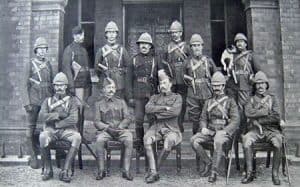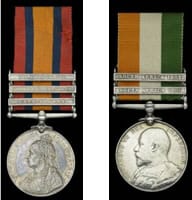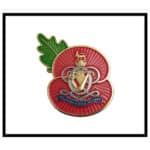South Africa 1900-03
On the 26th of December, 1899, orders were received at the Curragh Camp for the 8th Hussars to mobilise, and all the reservists of the regiment, together with 50 reservists of the 15th Hussars, were ordered to re-join the colours between the 28th of December 1899, and the 2nd of January 1900. On the 13th of January 1900, 139 more reservists of the 15th Hussars were also ordered to re-join the colours between the 18th and 22nd of January.

Officers of the 8th Hussars
They left the Curragh Siding in three trains on the morning of the 13th of February, for Queenstown. The full total of 8th Hussars embarking for active service in South Africa was as follows:- 19 officers, 586 warrant officers, non-commissioned officers and men, 29 chargers and 458 troop horses. On reaching Queenstown in the afternoon boarding began and the S.S. Norseman sailed later that evening.
The 8th Hussars reached Cape Town on the 9th of March 1900.
The 8th Hussars were in the 4th Cavalry Brigade commanded by General Dickson with 7th Dragoon Guards and 14th Hussars as well as ‘O’ Battery RHA. They took part in the battle of Wepener, Zand River and the two-day battle of Diamond Hill on 11th-12th June. They also took part in the Battle of Belfast on the 27th of August.
In the march, which started on the 12th of October from Machadodorp to Heidelberg, ‘A’ Squadron of the 8th along with the 14th Hussars and ‘M’ Battery were under Colonel Mahon,
On the 13th Mahon “became heavily engaged near Geluk with a body of 1100 men with four guns. Although hardly pressed Mahon succeeded in holding his own until the French came to his assistance when the Boers were driven back in a south-easterly direction, having sustained some loss”. The enemy was on this occasion very daring and crept up through the broken ground to within 100 yards. The 8th Hussars were for a time very hard-pressed but held on well. They lost 2 officers, Lieutenants P.A.T. Jones and F.H. Wylam, and 7 men killed, and 2 officers and 8 men wounded. The remainder of the regiment was on arduous outpost duty night after night in very bad weather, suffering from cold and lack of food.
Cold and hunger were to be constant problems for the 8th Hussars through to the spring of 1901. The regiment was split into detachments posted to various columns, involved in independent actions. One of the columns was commanded by Lieutenant Colonel Duff the 8th’s Commanding Officer so when the regiment was re-united in 1902 they were commanded by Major Henderson. They formed part of a hussar column with the 18th and 19th which engaged in great driving actions that helped bring about the eventual downfall and surrender of the Boers in May 1902.
The 8th Hussars then marched to Pretoria where they stayed until 28th October 1903 when they sailed home.
The 8th Hussars was awarded the battle honour: SOUTH AFRICA 1900-02.
Gallantry Awards
- Lt R Lambert DSO
- 1725 RSM W Mountford DCM
- 2933 SSM JF Burns DCM
- 3729 Sgt WM Hughes DCM
- 3714 Sgt E Parry DCM
Campaign Medals
 The Queen’s South Africa Medal was awarded to all those who served in the Boer War in South Africa between 11th October 1899 and 31 May 1902.
The Queen’s South Africa Medal was awarded to all those who served in the Boer War in South Africa between 11th October 1899 and 31 May 1902.
The King’s South Africa Medal was the second campaign medal for the South African or ‘Boer War’, awarded to all those who were in theatre on, or after the 1st January 1902, and had completed 18 months of service in the conflict prior to 1st June 1902.
Service did not have to be continuous, the recipient would have had to serve from December 1900 to have 18 months of service before the war ended in May 1902.
Medal Clasps:


